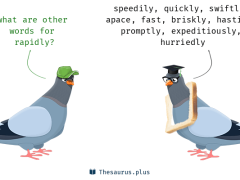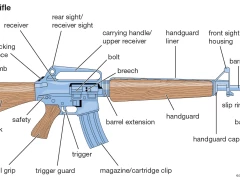prisoner [ˈprizənə] n. 囚犯
bush [buʃ] n. 灌木丛
rapidly [ˈræpidli] adv. 迅速地
【扩】fleetly 迅速地
* * *
A: Her health rapidly failed.
B: What can we do to help her now?
A:她的健康情况迅速恶化了。
B:我们现在能做点什么来帮他吗?
* * *
uniform [ˈjuːnifɔːm] n. 制服
rifle [ˈraifəl] n. 来福枪,步枪
shoulder [ˈʃəuldə] n. 肩
【搭】shoulder to shoulder 肩并肩地
* * *
A: It's a little tight through back and shoulders.
B: I can let out a bit at the back and shoulders.
A:后背和两肩有点紧。
B:我可以把后背和两肩放出一点。
* * *
march [mɑːtʃ] v. 行进
boldly [ˈbəuldli] adv. 大胆地
【扩】nervily 大胆地 hardily 大胆地
* * *
A: Speak it out boldly.
B: Whatever I will say must be kept secret.
A:大胆地说出来。
B:我接下来说的话必须保密。
* * *
blaze [bleiz] v. 闪耀
salute [səˈluːt] v. 行礼
elderly [ˈeldəli] adj. 上了年纪的
* * *
A: His elderly mother is always missing him.
B: How often does he go back to see his mother then?
A:他上了年纪的母亲时刻惦念着他。
B:那他多长时间回去看一次他的母亲?
* * *
grey [ɡrei] adj. 灰白的
sharp [ʃɑːp] adj. 猛烈的
【派】sharply 剧烈地
* * *
A: It couldn't stand such a sharp blow.
B: Sorry, but can you tell me what should I do instead of that?
A:它经受不住这么猛烈的敲击。
B:对不起,但是你能否告诉我我应该怎么做?
* * *
blow [bləu] n. 打击
noun [具体名词]犯人,囚犯;俘虏,战俘;为…所困的人 - The committee is concerned about the large number of prisoners sharing cells.
a prisoner of war = POW 战俘
- What items may a POW retain?
noun [具体名词]灌木,灌木丛;荒野,丛林地带;衬套;绝缘套管;浓密的头发 - Trees and bushes grew down to the water's edge.
verb [vt. 及物动词]蓬松;伸展,丛生;以灌木装饰 - He snapped a twig off a bush.
adjective [原级]如灌木般长得低矮的;<非正式>粗野的;<美>低劣的,便宜的 - Luckily, a bush broke his fall.
adverb [程度副词]快速地,迅速地 - Crime figures are rising rapidly.
do sth. rapidly 迅速做某事
- The man acted rapidly.
noun [具体名词]制服,校服;<非正式>穿制服的警官;(某一群体的人穿的)典型服装,特有服装;(无线电通讯)字母 U 的代码 - The police wear dark blue uniforms.
adjective [原级]全部相同的,始终如一的;制服式的 - If something is uniform, it does not vary, but is even and regular throughout.
verb [vt. 及物动词]使一致;使穿制服 - He was wearing a brown uniform.
noun [具体名词]步枪,来复枪;步枪队(rifles) - They shot him at point blank range with an automatic rifle.
verb [vt. 及物动词]快速搜寻,匆忙翻找;偷窃,盗取;用力掷,猛踢(球);为(枪、枪管或内膛)凿制来复线 - I discovered my husband rifling through the filing cabinet.
noun [具体名词]肩,肩膀;双肩,上背部(shoulders);(衣服的)肩部;(动物的)前腿连肩肉,肘子;山肩,瓶肩;<美> (公路旁的)路肩,紧急停车道;(担负责任或艰难困苦或提供力量的)肩膀;(四足动物的)肩背;(鸟、昆虫的)肩背 - When you talk about someone's problems or responsibilities, you can say that they carry them on their shoulders.
verb [vt. 及物动词]承担,担负;挤,闯;(用肩膀)推开,顶开;肩扛,肩挑 - If you shoulder the responsibility or the blame for something, you accept it.
verb [vi. 不及物动词]齐步走,行军;快步走;强迫(某人)一起走,押送;游行示威;进行,进展 - The demonstrators then marched through the capital chanting slogans and demanding free elections.
noun [具体名词]三月(March);示威游行;行进,行军;稳步发展;进行曲 - After a short march, the column entered the village.
① v.(部队)行军,行进
② v.(威风凛凛/从容不迫地)走,迅速地走
- Jane marched out of the room without saying a word.
adverb [方式副词]大胆地;冒失地;显眼地 - You must act boldly and confidently.
verb [vt. 及物动词]熊熊燃烧;闪耀,发亮光;<正式>怒视,(怒火)燃烧;醒目地刊登在报纸等上,大肆宣扬;(枪炮)连续射击(或开火);<非正式> 夺取,摘取;大力击(球);在树皮上刻路标;<喻>带头,开拓;快速移动 - The log fire was blazing merrily.
noun [具体名词]大火,烈火;火焰;(光或色彩等的)展现,灿烂;(强烈感情的)迸发;(刻在树上用于指示道路的)标记,记号;(尤指马面部的一条)白斑 - Some 4,000 firefighters are battling the blaze.
verb [vt. 及物动词](向…)行军礼,(向…)致敬;(尤指公开地)赞扬,颂扬;(尤指用手或身体动作)向…打招呼,向…致意 - One of the company stepped out and saluted the General.
noun [具体名词]敬礼,举手礼;致敬,致意; 鸣礼炮,鸣炮致敬;举剑致敬 - I salute the governor for the leadership role that he is taking.
adjective [原级]上了年纪的;老掉牙的 - There was an elderly couple on the terrace.
noun [具体名词]老人(the elderly) - The elderly are a formidable force in any election.
adjective [原级]灰色的;(头发)灰白的,花白的;(面色)苍白的;(天气)昏暗的,阴沉的;单调乏味的,毫无吸引力的;阴郁的,暗淡的;老年人的;不明确的,难以处理的;(金融或贸易活动)不在官方统计数字之内的,灰色的;<南非>(与)民族杂居区(相关)的,黑人白人杂居区的 - He dresses in sober grey suits.
noun [专属名词]灰色,灰色颜料;灰色衣服;灰白头发;灰马,白马 - The ceiling was grey and cracked.
adjective [原级]锋利的;尖的;(沙子,沙砾)由尖颗粒组成的;急转弯的;急剧的,骤然的(变化);清晰的,鲜明的;剧烈的,强烈的;(语言)尖锐的,尖刻的;刺耳的;聪明的,敏锐的;(味道)浓烈的,辛辣的;吸引人的,时髦的;(风或霜)刺骨的;狡诈的;升半音的;音调偏高的 - You can describe a shape or an object as sharp if part of it or one end of it comes to a point or forms an angle.
adverb [时间副词]正点,准时;急转向地;音调偏高地;突然地,急剧地 - Sharp is used after stating a particular time to show that something happens at exactly the time stated. (…
noun [抽象名词](音符的)升半音;升半音号(#);缝衣长针;锐利的东西(如针、注射器等)(sharps);<非正式>骗子 - Sharp is used after a letter representing a musical note to show that the note should be played or sung half a tone higher. Sharp is often represented by the symbol ♯.
verb [vi. 不及物动词](风)刮,吹;(用嘴)吹气;用力呼吸,喘息;吹响,吹奏;毁掉,炸毁;使(车胎)爆炸,使漏气;(保险丝)烧断,熔化;擤(鼻子);浪费,挥霍(金钱);出错;断送(良机);泄露,暴露;<美,非正式> 迅速离开(某地);用力投(球);(用于表示惊讶、气恼等);开花,在开花;(鲸鱼)喷水;吹制(玻璃);把蛋清和蛋黄从(蛋壳)中吹出;(苍蝇)产卵于 - A chill wind blew at the top of the hill.
noun [抽象名词]大风,强风;吹气,擤鼻子;呼吸新鲜空气;猛击,一击;(为争取或反对某事而进行的)奋斗,努力;失望,打击,挫折;开花,开花期;<非正式>爵士乐演奏;(炼钢用语)吹炼;<非正式>大麻 - He went to the hospital after a blow to the face.













